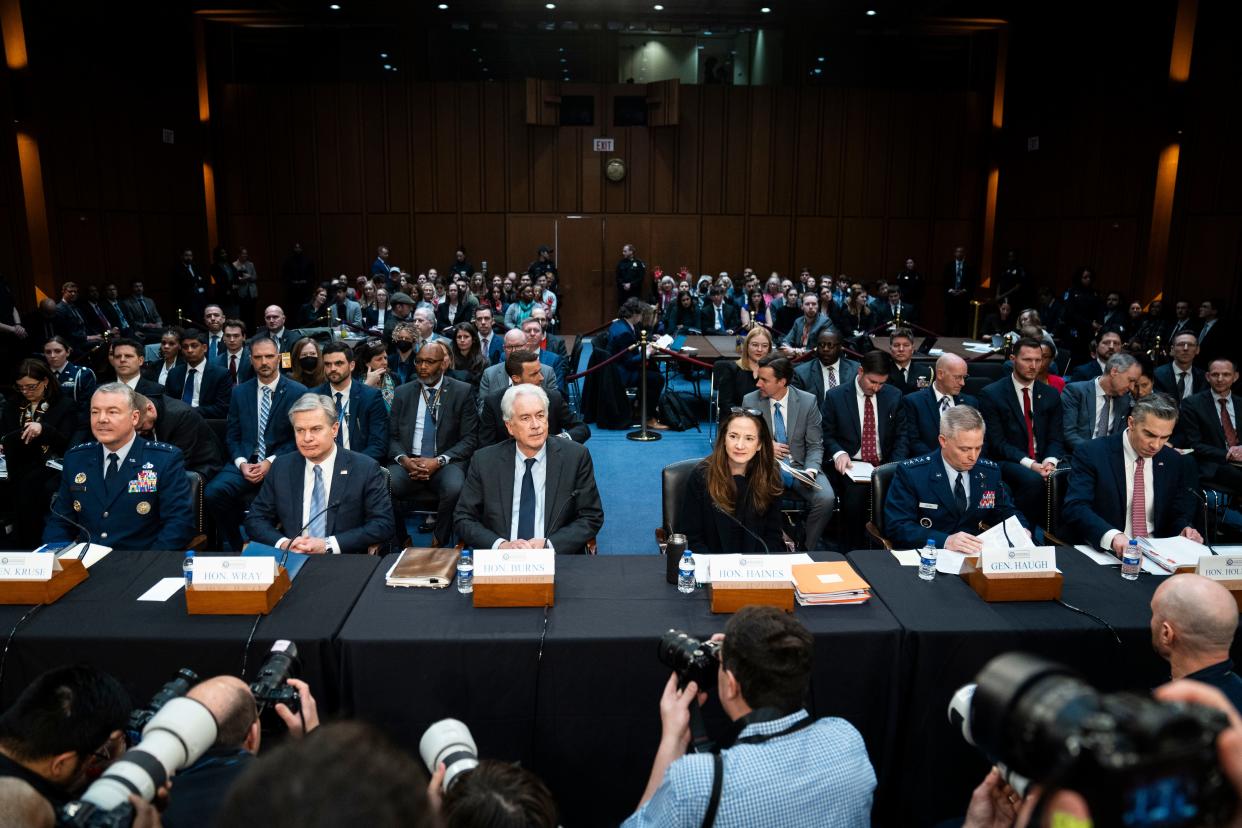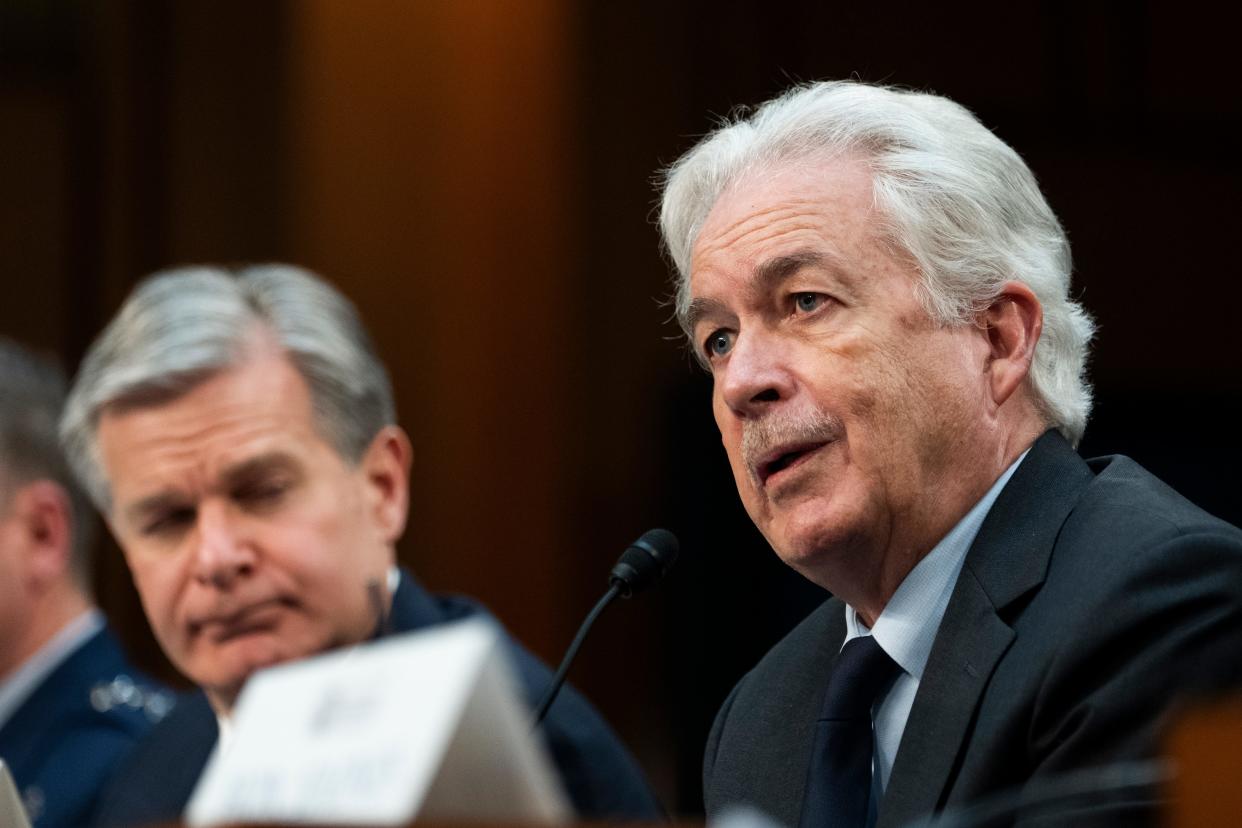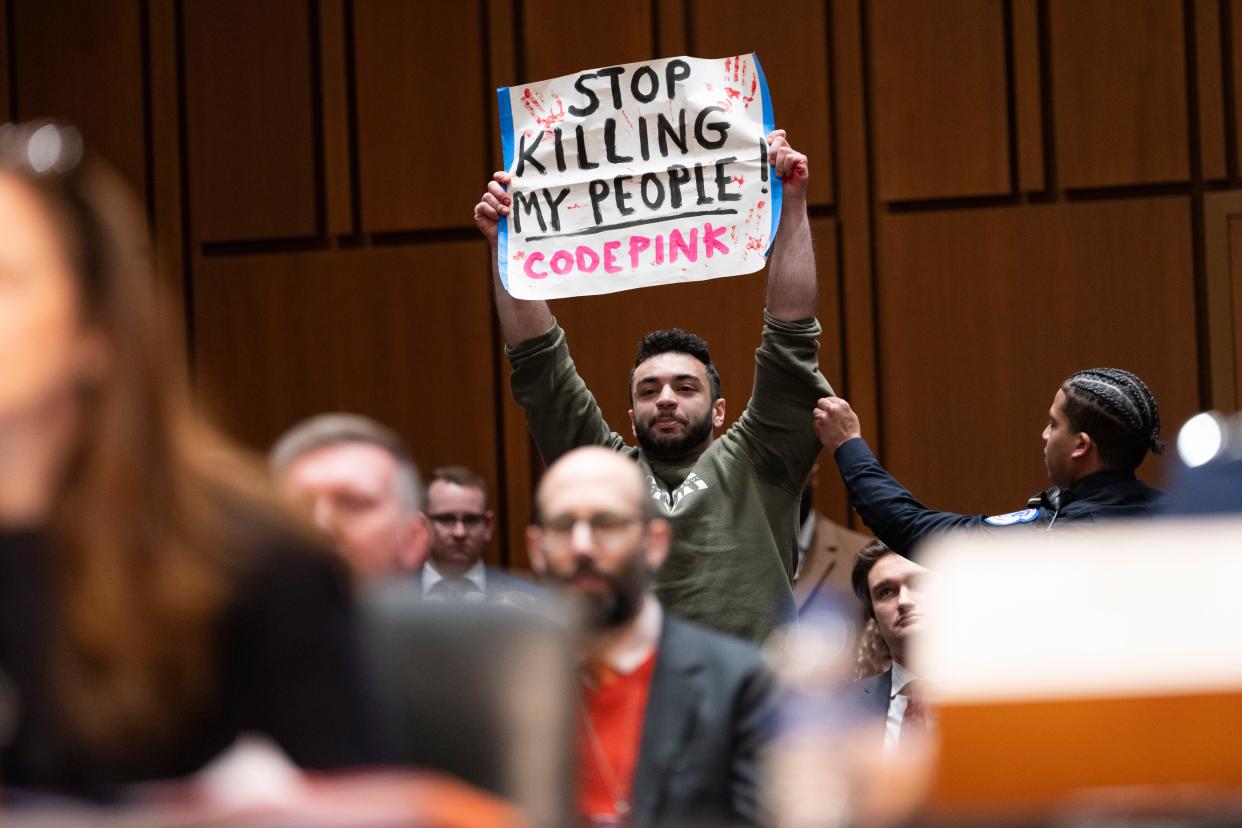Meddling in elections, drugs and terrorism? Here's the U.S. intel new list of threats
WASHINGTON – Elections being held this year in the United States and around the world will be under attack more than ever from misinformation and disinformation, Sen. Mark Warner, D-Va., warned Monday at the Senate Intelligence Committee’s annual worldwide threats hearing.
Such attacks, he said, are “increasingly deployed cheaply by an array of adversarial actors,” including hostile foreign nations.
Warner, the intel committee chairman, and ranking Republican Sen. Marco Rubio of Florida, heard testimony on a broad away of threats from Director of National Intelligence Avril Haines and the leaders of the nation’s intelligence agencies, including the FBI, CIA, National Security Agency and Defense Intelligence Agency.
Among the top concerns stated by lawmakers and intelligence officials Monday:
◾ China and Russia are increasingly targeting the U.S. as part of their geopolitical power plays via various means including military aggression and cyberattacks.
◾ Terrorist groups are exploiting the chaos in Afghanistan following the U.S. withdrawal in August 2021 to launch attacks in the region, including against pro-U.S. forces.
◾ Iran and its many proxies, like the Lebanon-based Hezbollah and the Houthis in Yemen, continue to pose a grave threat to U.S. interests overseas, with Rubio saying Hezbollah continues to target U.S. officials for assassination.
◾ Transnational criminal organizations are exploiting the immigration crisis at the U.S.-Mexico border to import illicit drugs. FBI Director Christopher Wray testified that the FBI alone seized enough fentanyl in the last two years "to kill 270 million people."
◾ Human trafficking networks, including one linked to the terrorist group Islamic State, are involved in smuggling people across the southern border into the U.S.
◾ Chinese organized crime groups and China-based traffickers are involved not only in providing precursor chemicals for fentanyl and methamphetamine to U.S. markets but also in setting up marijuana growing operations throughout the U.S. Republican Sen. Susan Collins said hundreds of them are operating in her home state of Maine alone.

‘Historic levels’ of fentanyl and illicit drugs
Haines said one particularly serious concern is that transnational criminal organizations and human smuggling operations are increasingly exploiting migrants for extortion, kidnapping and human trafficking while also moving “historic levels” of illegal drugs into the U.S.
She singled out Mexican drug cartels for moving large amounts of synthetic opioids, such as fentanyl, into the United States.
“More than 100,000 Americans have died from drug-related overdoses during the past year and most of those deaths have been attributed to illicit fentanyl,” Haines said. “As such, the threat from fentanyl and other synthetic drugs to the health and welfare of everyday Americans remains a top priority for the intelligence community.”
Haines urged lawmakers to extend the provisions of Section 702 of the Foreign Intelligence Surveillance Act, which allows U.S. intelligence agencies to conduct warrantless surveillance of foreign nationals. It will expire on April 19 without congressional action.
"The intelligence gathered pursuant to Section 702 was essential in preparing this annual threat assessment and is absolutely fundamental to every aspect of our work, as I know you know," Haines said. "Section 702 provides unique insights into foreign intelligence targets such as foreign adversaries, terrorist organizations including Hamas, weapons proliferators, spies, malicious cyber actors and fentanyl traffickers and does so at a speed and reliability that we simply cannot replace with any other authority."
Lack of additional assistance for Ukraine a potential ‘historic mistake’
CIA Director William Burns, just back from his eighth trip to the Middle East to broker an agreement between Israel and Hamas, said that a possible truce is in its early stages of discussion. That could see a prisoner swap of about 40 Israeli women, “older men” and injured hostages, he said, in exchange for an unidentified number of Palestinian prisoners held by Israel. Also under discussion is a cease-fire of at least six weeks and a “major surge” in humanitarian assistance, Burns told lawmakers.
Burns also warned that the lack of additional assistance for Ukraine in 2024 would be a death knell of sorts for the country in beating back a well-equipped Russia that would have broader implications for the U.S.
“It seems to me that would be a massive and historic mistake for the United States,” Burns said. “They're running out of ammunition, and we're running out of time to help them.”

Asked what China would take away from the lack of continued U.S. support, Burns said, “Not only is that going to feed doubts amongst our allies and partners in the Indo-Pacific, it's going to stoke the ambitions of the Chinese leadership in contingencies ranging from Taiwan to the South China Sea.”
A new space race
Another of the intelligence committee’s top concerns, Warner said, is that “We are now even seeing the possibility of foreign adversaries weaponizing space in ways that can be massively destructive not only to our national security but to our way of life and useful tools such as GPS and satellite communications.”
The chairman of the House Intelligence Committee, Rep. Mike Turner, R-Ohio, disclosed last month that Congress was warned about new information detailing Russia's desire to put a nuclear weapon in space. Turner asked the Biden administration to "declassify all information relating to this threat so that Congress, the administration and our allies can openly discuss the actions necessary to respond to this threat.”
A threat to election security
At Monday’s hearing, Warner said the committee was especially concerned about the increasing threat posed by misinformation and disinformation during the upcoming elections.
Committee members, and U.S. intelligence and law enforcement officials, have said for years that they have found evidence of such meddling, especially by Russia in the 2016 and 2020 presidential elections and also the congressional midterms.
Last month, federal authorities arrested former FBI informant Alexander Smirnov after he was indicted for allegedly lying when he claimed that President Joe Biden and his son Hunter took $5 million in bribes from the Ukrainian energy company Burisma in 2020. The Justice Department said Smirnov got the false claim from his contacts in the upper echelons of Russian intelligence.
More: Dems want answers: Why did GOP use Russia's Alexander Smirnov in Biden impeachment probe?
“We all know that more than 60 countries – over half the world's population – will vote this year. And I am deeply concerned that democracy including in the United States is under a greater threat than ever from these foreign adversaries,” Warner said.
“Bad actors like Russia are particularly incentivized to interfere, given what's at stake in Ukraine,” he said. “Poll after poll increasingly demonstrate that Americans are distrustful of traditional sources of information. And while AI provides the tools to spread sophisticated misinformation at an unprecedented speed and scale, our ability to respond has been hamstrung by recent litigation pending before the Supreme Court that has had a chilling effect on the voluntary sharing of everything related to foreign malign influence threats between U.S. government agencies and social media companies.”
Warner and Rubio also appeared on CBS “Face the Nation” on Sunday to share their concerns about foreign interference in the upcoming elections.
“You, Sen. Warner, said last month that we are less prepared for foreign interference in 2024 than we were in 2020. What exactly are you concerned about?” asked moderator Margaret Brennan.
“Well, we have nation states, China, Iran, Russia, who know that interfering in our elections is both effective and cheap,” Warner said.
Rubio added that with so many issues already dividing Americans, the threat posed by foreign actors now extends well beyond influencing just elections.
“It's now an effort to influence our policy debates, to divide us year-round,” he said. “Russia does it and they've done it for a long time. The Chinese want to get into this business. The Iranians and others will join them – and not just here. We've already seen examples of it in other democratic nations. It's a growing risk.”

A 'generational' threat
Their testimony was interrupted at least three times by protesters arguing for Israel to stop killing Palestinian civilians in Gaza and for a cease-fire in the Israel-Hamas war that has raged since Hamas attacked Israel and killed more than 1,200 people last Oct. 7 and took as many as 240 people hostage. Each protester, including some carrying signs, was escorted out of the hearing following their outburst.
Haines, who oversees all 18 U.S. intelligence agencies, said the Oct. 7 attack on Israel – and Israel’s war on Hamas in response – have prompted a resurgence in threats to U.S. interests by Islamic groups including al-Qaeda and groups linked to ISIS, or the Islamic State, and Iran.
The conflict has also inspired individuals on both sides “to conduct acts of antisemitism and Islamophobic terror worldwide,” Haines said, and “galvanized violence by a range of actors around the world.”
“And while it is too early to tell," she added, "it is likely that the Gaza conflict will have a generational impact on terrorism.”
Haines and the other intel chiefs later met with the committee members in a classified setting to discuss the threats in more detail. And they are set to appear before the House Intelligence Committee on Tuesday to give a similar briefing, as they do every year.
This article originally appeared on USA TODAY: Biggest threats at home and abroad? Election meddling makes the list
